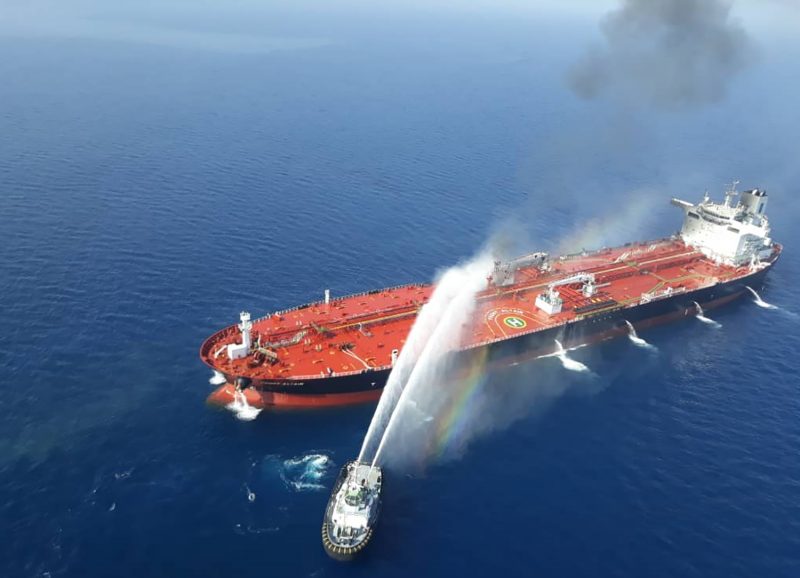Gulf powers urge action to secure energy supplies as tankers port-bound
An Iranian navy boat trying to control fire from Norwegian owned Front Altair tanker said to have been attacked in the waters of the Gulf of Oman (-)
Dubai (AFP) – Saudi Arabia and the UAE on Saturday called for decisive action to protect energy supplies amid a tense US-Iran standoff as two tankers attacked in a vital Gulf shipping channel headed to port.
The United Arab Emirates’ Foreign Minister Sheikh Abdullah bin Zayed Al Nahyan called on world powers “to secure international navigation and access to energy”, a plea echoed by regional ally Saudi Arabia after the incident sent crude prices soaring.
The two tankers — the Japanese-owned Kokuka Courageous that was carrying highly flammable methanol when it was rocked by explosions and the Norwegian Front Altair — were heading to port on Saturday, owners and shipping officials said.
The US military on Friday released grainy footage it said showed an Iranian patrol boat removing an “unexploded limpet mine” from one of the tankers.
US President Donald Trump has said the twin attack in the Gulf of Oman on Thursday had Iran “written all over it”, rejecting Tehran’s vehement denial.
Iran has repeatedly threatened to block the Hormuz Strait, a narrow seaway vital to the world’s oil supplies, in the event of a conflict with the US.
The UAE’s Sheikh Abdullah, whose country is bitterly opposed to Iranian influence in the region, called Saturday for a deescalation of tensions.
“We remain hopeful in attaining a broader framework for cooperation with Iran,” he said at a summit in Bulgaria.
Meanwhile, Saudi Arabia’s Energy Minister Khalid al-Falih called for a “swift and decisive” response to threats against energy supplies after Thursday’s “terrorist acts”.
Gulf Cooperation Council secretary general Abdullatif al-Zayani also called the attack a “direct threat” to energy supplies, calling on world powers to protect international shipping lanes and hold the perpetrators accountable.
– Vessels head to port –
The Japanese tanker’s Tokyo-based operator Kokuka confirmed Saturday the vessel was heading to port in the UAE.
“We still don’t know if the tanker goes to Khor Fakkan or Fujairah as they are very close,” said a spokesman, referring to two Emirati ports on the Gulf of Oman.
Maritime experts would then seek to transfer the highly flammable cargo to shore, according to an unnamed official quoted by Japanese state media.
“From a viewpoint of global energy security, it is necessary for the international community to jointly deal with the act,” said Japanese trade minister Hiroshige Seko at a G20 energy and environment meeting in Japan on Saturday.
The other ship, the Norwegian-operated Front Altair, has left Iran’s territorial waters, multiple sources said Saturday.
The ship is “heading toward the Fujairah-Khor Fakkan area in the United Arab Emirates”, head of ports for Iran’s southern province of Hormozgan told the semi-official news agency ISNA.
The tanker “has left Iran’s territorial waters,” he said, adding that it was being towed and sprayed with water to cool the hull.
Frontline Management, the Norwegian company which owns the ship, confirmed it had left Iranian waters and said “the 23 crew members… remain safe and well, with plans being made for their repatriation soonest”.
– ‘Allegations against Iran’ –
Iranian Foreign Minister Mohammad Javad Zarif tweeted that the US had “immediately jumped to make allegations against Iran without a shred of factual or circumstantial evidence.”
The United States has also accused Iran over May 12 sabotage attacks on four tankers anchored in the Gulf of Oman off Fujairah.
UN Secretary-General Antonio Guterres called for an independent investigation.
“It’s very important to know the truth (and) that responsibilities are clarified,” he told reporters at UN headquarters in New York.
“Obviously that can only be done if there is an independent entity that verifies those facts.”
The oil tankers hit Thursday morning were 10 nautical miles apart and heading for Asia when they were struck by explosions after passing through the Strait of Hormuz, some 25 nautical miles off Iran’s southern coast.
The Front Altair was carrying naphtha, a refined petroleum product, when it was hit by three explosions, according to Norwegian officials.
Blocking the Hormuz Strait would be a relatively low-tech, high-impact countermeasure Iran could take against any attack by the United States, and would severely disrupt global oil supplies.
But Trump played down the threat.
“It’s not going to be closed, it’s not going to be closed for long and they know it. They’ve been told in very strong terms,” he said on Friday, referring to Iran.
bur-gw-sy-mah-ac/dwo
Disclaimer: Validity of the above story is for 7 Days from original date of publishing. Source: AFP.


